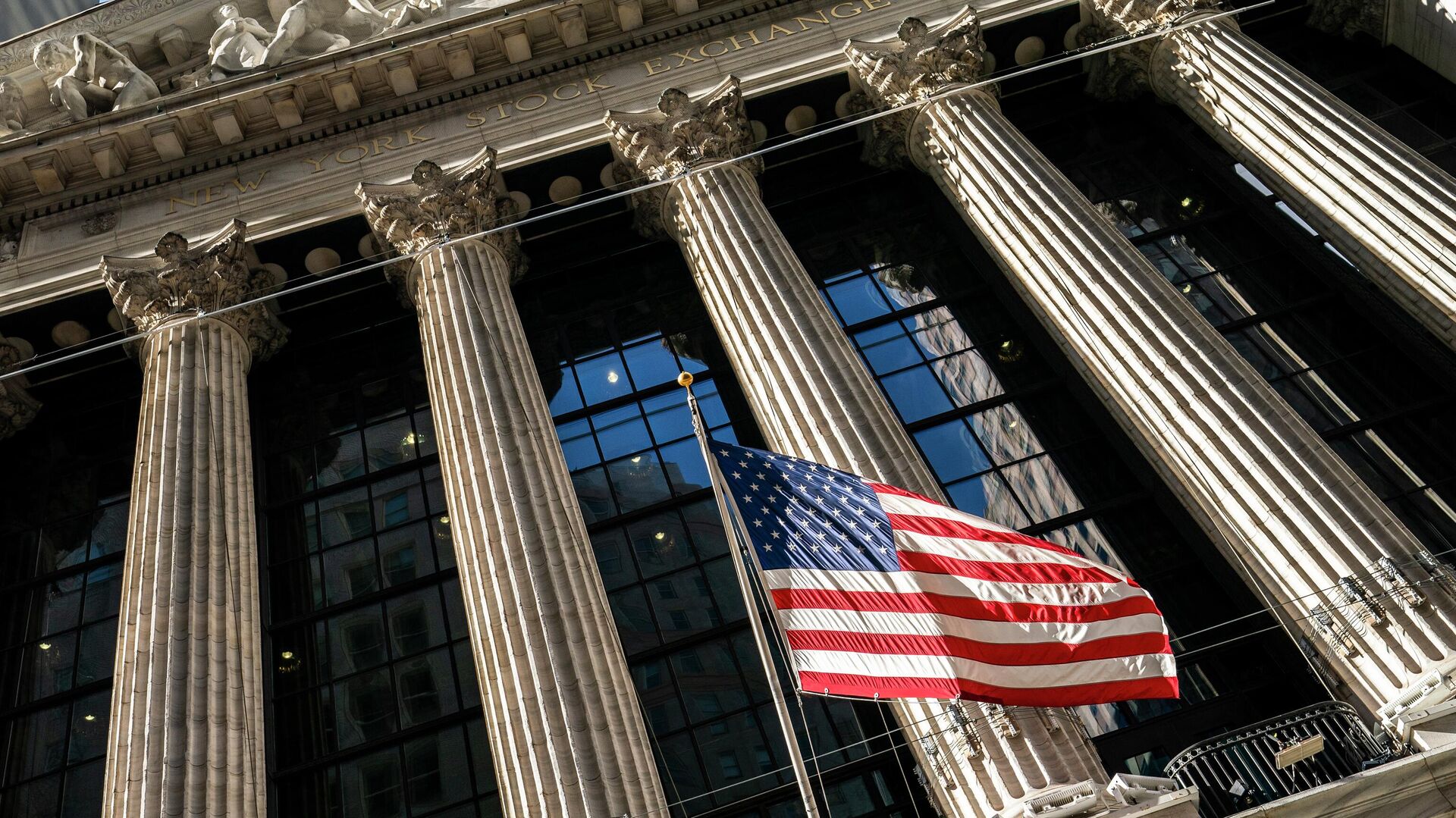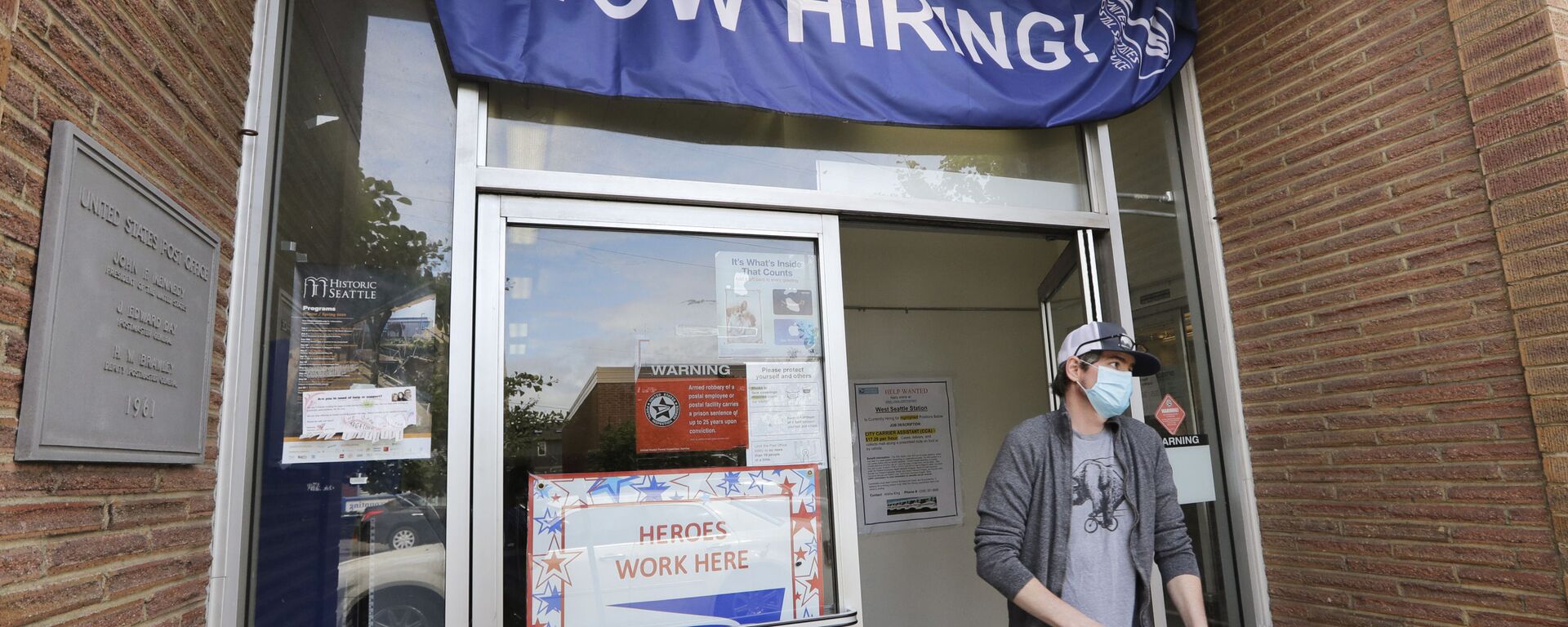https://sputnikglobe.com/20220803/feds-bullard-claims-its-hard-to-call-us-recession-when-job-market-so-strong-1098085580.html
Fed’s Bullard Claims It's Hard to Call US Recession When Job Market 'So Strong'
Fed’s Bullard Claims It's Hard to Call US Recession When Job Market 'So Strong'
Sputnik International
WASHINGTON (Sputnik) - The United States may technically be in a recession but it is hard to make a case for an economic slowdown in a country whose job market... 03.08.2022, Sputnik International
2022-08-03T17:18+0000
2022-08-03T17:18+0000
2022-08-03T17:18+0000
us
recession
job
job market
https://cdn1.img.sputnikglobe.com/img/07e6/05/04/1095272424_0:321:3071:2048_1920x0_80_0_0_567714ac57b74db48660415d8f7574c6.jpg
“With all the job growth in the first half of the year, it’s hard to say there’s a recession,” Bullard told CNBC in an interview. “The job market is so strong. With a flat unemployment rate at 3.6%, it’s hard to say there’s a recession.”US unemployment reached a record high of 14.8% in April 2020, with the loss of some 20 million jobs in the aftermath of the coronavirus breakout. Jobs recovery has been stellar since, with the unemployment rate staying at 3.6% since April this year, below the 4% defined by the Fed as “maximum employment.”The runaway jobs growth and surging wages have also led to runaway inflation, with prices of goods and services growing at their fastest since the 1980s.After four interest rate hikes since March that brought key lending rates from nearly zero to as high as 2.5%, the Fed is nonplussed that inflation, as measured by the Consumer Price Index, hasn’t budged from four-decade highs, growing at a pace of 9.1% in the year to June.Economists say the Fed’s rate hikes and cutbacks in pandemic-related stimulus spending had contributed to negative gross domestic product in the first two quarters of this year, resulting in a technical recession. Bullard and other Fed officials, led by President Joe Biden’s economic advisers, dispute such a textbook definition of recession.“We’re not in a recession right now,” Bullard said. “We do have these two quarters of negative GDP growth. To some extent, a recession is in the eyes of the beholder. I still think we'll get positive GDP growth in the second half of this year.”The St. Louis Fed president joined other regional heads of the central bank, including San Francisco Fed’s Mary Daly and Cleveland Fed’s Loretta Mester, in calling for continuous rate hikes till there was solid evidence that inflation was in retreat.“We’re going to have to see convincing evidence across the board, headline and other measures of core inflation, all coming down convincingly before we’ll be able to feel like we’re doing our job,” he said.Bullard said he aspired for a top-end rate of 4% by the year-end. That meant another 1.5% increase from the current top-end of 2.5% — or an average of a 50-basis point hike at each of the three remaining Fed rate decisions between September and December.
https://sputnikglobe.com/20220803/nearly-12-of-us-adults-lost-income-in-july-despite-record-jobs-growth---morning-consult-1098083853.html
Sputnik International
feedback@sputniknews.com
+74956456601
MIA „Rossiya Segodnya“
2022
Sputnik International
feedback@sputniknews.com
+74956456601
MIA „Rossiya Segodnya“
News
en_EN
Sputnik International
feedback@sputniknews.com
+74956456601
MIA „Rossiya Segodnya“
Sputnik International
feedback@sputniknews.com
+74956456601
MIA „Rossiya Segodnya“
us, recession, job, job market
us, recession, job, job market
Fed’s Bullard Claims It's Hard to Call US Recession When Job Market 'So Strong'
WASHINGTON (Sputnik) - The United States may technically be in a recession but it is hard to make a case for an economic slowdown in a country whose job market is at one of its strongest ever, St. Louis Federal Reserve President James Bullard said Wednesday.
“With all the job growth in the first half of the year, it’s hard to say there’s a recession,” Bullard told CNBC in an interview. “The job market is so strong. With a flat unemployment rate at 3.6%, it’s hard to say there’s a recession.”
US unemployment reached a record high of 14.8% in April 2020, with the loss of some 20 million jobs in the aftermath of the coronavirus breakout. Jobs recovery has been stellar since, with the unemployment rate staying at 3.6% since April this year, below the 4% defined by the Fed as “maximum employment.”
The runaway jobs growth and surging wages have also led to runaway inflation, with prices of goods and services growing at their fastest since the 1980s.
After four interest rate hikes since March that brought key lending rates from nearly zero to as high as 2.5%, the Fed is nonplussed that inflation, as measured by the Consumer Price Index, hasn’t budged from four-decade highs, growing at a pace of 9.1% in the year to June.
Economists say the Fed’s rate hikes and cutbacks in pandemic-related stimulus spending had contributed to negative gross domestic product in the first two quarters of this year, resulting in a technical recession. Bullard and other Fed officials, led by President Joe Biden’s economic advisers, dispute such a textbook definition of recession.
“We’re not in a recession right now,” Bullard said. “We do have these two quarters of negative GDP growth. To some extent, a recession is in the eyes of the beholder. I still think we'll get positive GDP growth in the second half of this year.”
The St. Louis Fed president joined other regional heads of the central bank, including San Francisco Fed’s Mary Daly and Cleveland Fed’s Loretta Mester, in calling for continuous rate hikes till there was solid evidence that inflation was in retreat.
“We’re going to have to see convincing evidence across the board, headline and other measures of core inflation, all coming down convincingly before we’ll be able to feel like we’re doing our job,” he said.
Bullard said he aspired for a top-end rate of 4% by the year-end. That meant another 1.5% increase from the current top-end of 2.5% — or an average of a 50-basis point hike at each of the three remaining Fed rate decisions between September and December.


